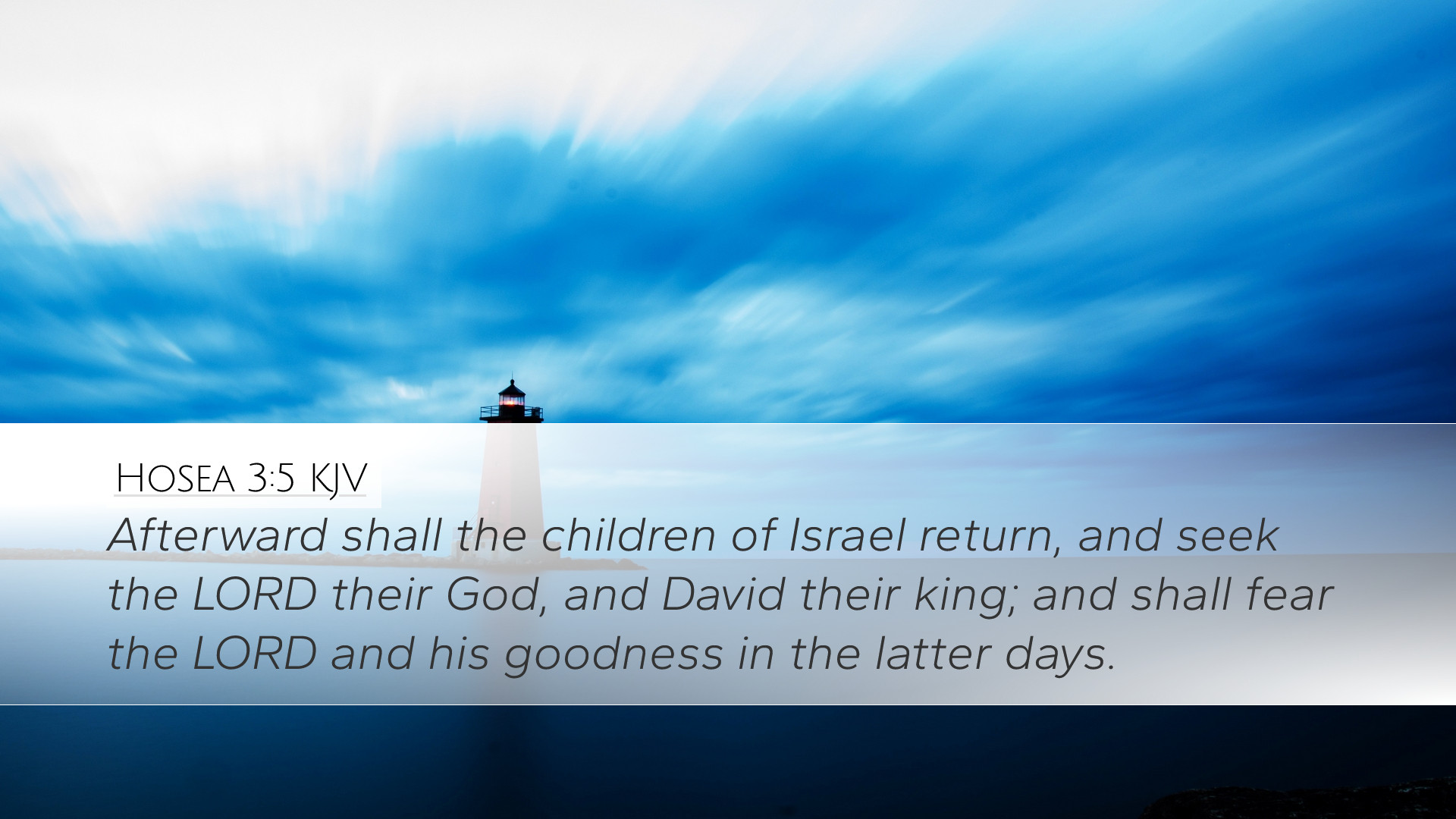Old Testament
Genesis Exodus Leviticus Numbers Deuteronomy Joshua Judges Ruth 1 Samuel 2 Samuel 1 Kings 2 Kings 1 Chronicles 2 Chronicles Ezra Nehemiah Esther Job Psalms Proverbs Ecclesiastes Song of Solomon Isaiah Jeremiah Lamentations Ezekiel Daniel Hosea Joel Amos Obadiah Jonah Micah Nahum Habakkuk Zephaniah Haggai Zechariah MalachiHosea 3:5
Hosea 3:5 KJV
Afterward shall the children of Israel return, and seek the LORD their God, and David their king; and shall fear the LORD and his goodness in the latter days.
Hosea 3:5 Bible Commentary
Commentary on Hosea 3:5
Hosea 3:5 states: "Afterward shall the children of Israel return, and seek the LORD their God, and David their king; and shall fear the LORD and his goodness in the latter days." This verse encapsulates a significant theme of hope and restoration following periods of rebellion and idolatry. Here, we draw insights from various public domain commentaries to elucidate the theological and practical implications of this verse for contemporary audiences.
Contextual Overview
Hosea, a prophet of Israel, speaks during a turbulent time in the northern kingdom, focusing on God's enduring love amidst Israel’s unfaithfulness. The context of this verse is pivotal, as it speaks of a future restoration that entails both a turning back to God and a recognition of His sovereign plan through a Messianic king.
Background of Hosea
Matthew Henry emphasizes that the book of Hosea is not merely a historical account but a profound theological treatise on the love of God for His people. The prophet’s personal experiences parallel the nation's spiritual unfaithfulness, presenting a vivid picture of God’s unfailing love contrasted with Israel's waywardness.
Thematic Considerations
-
Restoration and Hope:
Hosea 3:5 signifies a turning point where Israel, after a period of estrangement, will return to God. Albert Barnes notes that this return symbolizes a renewal of covenantal fidelity, which is central to Israel's relationship with Yahweh. It underscores the hope that, despite the depths of sin, redemption is always possible.
-
Messianic Expectation:
Jones Clarke discusses the reference to "David their king" as a foreshadowing of Christ. During the time of Hosea, the monarchy was in decline, and the people longed for a leader who could restore the kingdom. This alludes to Jesus, who fulfills the promise of a king from David's line, thereby providing both a historical and prophetic depth to the verse.
-
The Fear of the Lord:
The phrase "shall fear the LORD" reflects a profound reverence towards God. Henry portrays this fear as not merely a dread but a healthy acknowledgment of God’s majesty and holiness, leading to worship and obedience. This fear is essential for a right relationship with God.
The Role of Repentance
The transition from estrangement to communion with God is highlighted in this verse. Scholars suggest that true repentance involves both turning from sin and turning towards God. Hosea’s message correlates with the New Testament’s call for repentance, as believers are invited to turn their hearts back to God and seek His righteousness.
God’s Goodness in the Latter Days
In concluding the verse, the mention of "his goodness in the latter days" introduces eschatological themes. Henry notes that the latter days suggest a time of fulfillment when God’s promises are ultimately realized. This ties into both Jewish eschatology and Christian theology, where the ultimate restoration of Israel and the establishment of God’s kingdom is anticipated.
Theological Reflections
-
Divine Faithfulness:
This verse emphasizes God’s faithfulness to His covenant. Despite Israel's unfaithfulness, He remains committed to restoring His people, demonstrating that His love endures even through judgment.
-
The Sovereignty of God:
The sovereignty of God is paramount in this restoration narrative. Clarke reminds readers of God's ability to bring about change in the hearts of His people, leading them back to Himself irrespective of their previous wanderings.
-
Universal Application:
The themes in Hosea 3:5 are not limited to Israel alone; they resonate with the global church. Just as Israel is called to return, believers today are beckoned to continually seek the Lord, affirming that God’s call for repentance and faithful service is eternal.
Practical Implications for Today
For pastors, students, and theologians, Hosea 3:5 provides profound lessons for ministry and spiritual formation. It challenges individuals and communities to reflect on their relationship with God and to engage in genuine repentance.
-
Encouragement for the Wayward:
This verse serves as assurance that no matter how far one strays, the path back to God is always available. Pastoral care can be deeply informed by the message of hope and restoration found in this verse.
-
Call to Fear the Lord:
In a culture marked by moral relativism, the call to 'fear the Lord' remains crucial. This reverence can reshape community worship and ethics, anchoring believers in a fear that leads to deeper commitment and holiness.
-
Eschatological Hope:
The promise of restoration brings eschatological hope that can galvanize the church’s mission. Understanding the 'latter days' can inform how believers live in anticipation of God's fulfillment of His plans.
Conclusion
Hosea 3:5 encapsulates the essence of God’s redemptive plan, highlighting themes of restoration, fear of the Lord, and eschatological hope. By tapping into the wisdom of public domain commentaries, we gain a multi-faceted understanding of this verse that is rich with practical and theological significance. The text invites every reader—be it pastor, student, or scholar—to engage in this transformative narrative, recognizing their own need for God’s grace and the unfolding reality of His kingdom.


